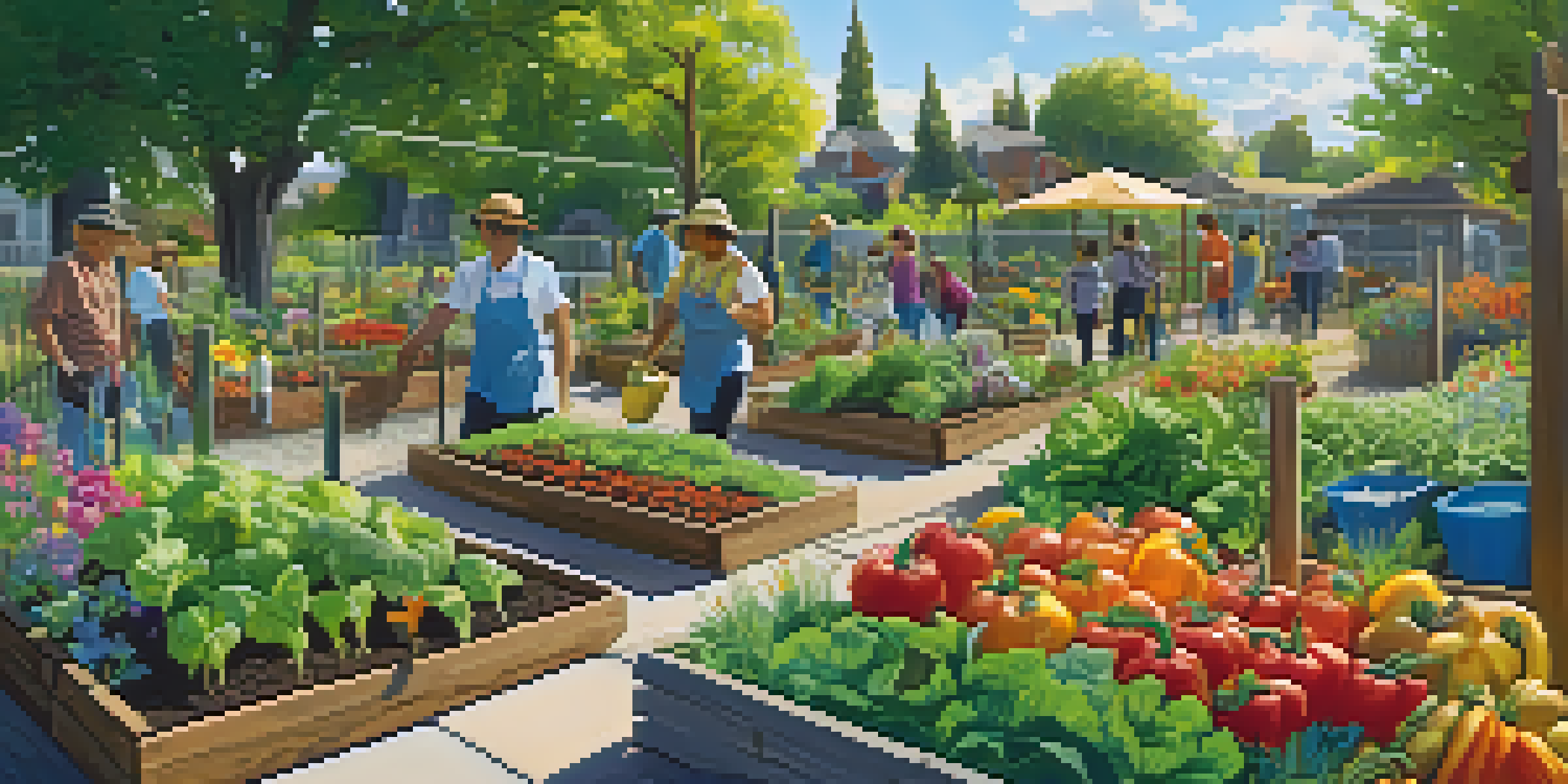The Role of HOAs in Promoting Sustainable Community Practices

Understanding HOAs and Their Influence on Communities
Homeowners' Associations (HOAs) play a vital role in managing residential communities. They set the rules and guidelines that govern how properties are maintained and how residents interact with one another. This influence can extend beyond aesthetics to include sustainability initiatives that benefit the entire neighborhood.
In every community, there is work to be done. In every nation, there are wounds to heal. In every heart, there is the power to do it.
By establishing community standards, HOAs can encourage environmentally friendly practices among homeowners. For instance, they can promote the use of native plants in landscaping, which reduces water consumption and supports local wildlife. This not only enhances the beauty of the community but also contributes to ecological balance.
Moreover, HOAs have the unique ability to rally residents around common goals. By fostering a sense of community and shared responsibility, HOAs can inspire members to adopt more sustainable practices, creating an environment where everyone feels invested in making a positive impact.
Implementing Green Policies and Guidelines
One of the primary ways HOAs can promote sustainability is by implementing green policies. These can include guidelines for energy-efficient home improvements, such as solar panel installation or the use of energy-efficient appliances. By encouraging these upgrades, HOAs not only enhance property values but also contribute to a decrease in the community's overall carbon footprint.

HOAs can also establish rules that foster the use of sustainable materials in property renovations. For example, they might encourage the use of recycled materials or sustainable wood products, which can make a significant difference in reducing waste. This kind of policy not only makes sense environmentally but also appeals to eco-conscious buyers.
HOAs Foster Community Sustainability
Homeowners' Associations play a crucial role in promoting sustainable practices that enhance community living and environmental responsibility.
Furthermore, HOAs can offer incentives for homeowners who adopt these green practices. Whether it's through reduced fees or recognition programs, these incentives can motivate residents to invest in sustainability, creating a win-win scenario for both the community and the environment.
Creating Community Gardens and Green Spaces
Community gardens are an excellent way for HOAs to promote sustainability while fostering community spirit. By transforming underutilized spaces into vibrant gardens, HOAs can provide residents with the opportunity to grow their own fruits and vegetables. This not only encourages healthier eating habits but also reduces the carbon footprint associated with transporting food.
Sustainability is no longer about doing less harm. It's about doing more good.
In addition to community gardens, HOAs can also prioritize the creation of green spaces such as parks and walking trails. These areas not only enhance the aesthetic appeal of the community but also provide residents with spaces to enjoy nature and engage in outdoor activities. This connection to the environment can promote a culture of sustainability among residents.
Moreover, these green spaces can be designed with sustainability in mind, using native plants that require less water and maintenance. By incorporating eco-friendly landscaping techniques, HOAs can create beautiful environments that align with sustainable practices, benefiting both residents and local ecosystems.
Encouraging Recycling and Waste Reduction Initiatives
Another critical area where HOAs can make a significant impact is in promoting recycling and waste reduction. By providing clear guidelines and resources for recycling, HOAs can encourage residents to participate actively. This could include designated recycling bins in the community and educational materials on what can and cannot be recycled.
Additionally, HOAs can organize community clean-up events or recycling drives to engage residents. These activities not only help reduce waste but also build camaraderie among neighbors. When residents come together for a common cause, it fosters a sense of community pride and responsibility.
Green Policies Boost Property Value
Implementing energy-efficient upgrades and sustainable materials through HOA guidelines can increase property values while reducing the community's carbon footprint.
Furthermore, HOAs can implement composting programs to minimize organic waste. By providing compost bins and educating residents on how to compost effectively, HOAs can help reduce the amount of waste sent to landfills while enriching the local soil. This initiative supports both sustainability and community engagement.
Organizing Workshops and Educational Programs
Education is key to promoting sustainable practices within a community. HOAs can organize workshops and seminars focused on various sustainability topics, such as energy conservation, gardening, and waste management. These educational programs empower residents with knowledge and practical tips they can implement in their daily lives.
For example, a workshop on energy efficiency could teach homeowners how to reduce their utility bills while minimizing their environmental impact. By providing actionable insights, HOAs can inspire residents to make more sustainable choices, ultimately benefiting the entire community.
Moreover, inviting local experts to lead these workshops can create a sense of connection and credibility. Residents may feel more inclined to participate when they see the value in learning from knowledgeable individuals who share their passion for sustainability.
Fostering Collaboration with Local Governments and Organizations
HOAs don’t have to work in isolation; collaborating with local governments and organizations can amplify their sustainability efforts. By forming partnerships, HOAs can access resources, funding, and expertise that may otherwise be unavailable. This collaboration can lead to more effective community programs and initiatives.
For instance, local governments may offer grants for community projects focused on sustainability, such as energy efficiency upgrades or green infrastructure improvements. HOAs can leverage these opportunities to enhance their initiatives, making them more impactful and beneficial for residents.
Education Drives Eco-Friendly Choices
Organizing workshops and educational programs empowers residents with the knowledge and tools to adopt sustainable practices in their daily lives.
Additionally, working with local environmental organizations can provide HOAs with valuable insights and support for their sustainability goals. These alliances can help create a more cohesive approach to sustainability, ensuring that the community remains informed and engaged in ongoing efforts.
Measuring Success and Celebrating Achievements
To ensure that sustainability initiatives are effective, HOAs should regularly measure their success. This can involve tracking participation rates in recycling programs, garden yields from community gardens, or energy savings from efficiency upgrades. By collecting data, HOAs can assess what’s working and where improvements are needed.
Celebrating achievements is also crucial in maintaining motivation and engagement among residents. Whether it’s through newsletters, community meetings, or social media, recognizing the efforts of individuals and the community as a whole can foster a positive culture around sustainability.

Moreover, sharing success stories can inspire other residents to get involved. When people see the tangible benefits of sustainability initiatives, they're more likely to participate, creating a ripple effect that can lead to even greater community involvement and commitment to eco-friendly practices.
The Future of HOAs and Sustainable Practices
As the world increasingly emphasizes sustainability, HOAs have a pivotal role in shaping environmentally responsible communities. The future will likely see more HOAs adopting green practices, from energy-efficient guidelines to waste reduction initiatives. This shift not only aligns with global sustainability trends but also enhances the quality of life for residents.
Moreover, as homeowners become more eco-conscious, the demand for sustainable practices within communities will grow. HOAs that prioritize these initiatives can attract prospective residents who value a commitment to sustainability, ultimately enhancing property values and community appeal.
In conclusion, the role of HOAs in promoting sustainable community practices is not just beneficial—it's essential for the future. By fostering collaboration, education, and community engagement, HOAs can lead the way in creating vibrant, sustainable neighborhoods that thrive for generations to come.